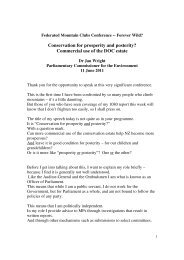August 2012 Issue - Federated Mountain Clubs of NZ
August 2012 Issue - Federated Mountain Clubs of NZ
August 2012 Issue - Federated Mountain Clubs of NZ
You also want an ePaper? Increase the reach of your titles
YUMPU automatically turns print PDFs into web optimized ePapers that Google loves.
“When I use a word,” Humpty Dumpty said in rather a scornful tone, “itmeans just what I choose it to mean – neither more nor less.”– Lewis Carroll, Through the Looking GlassI’m starting to wonder why we bother withnational park management plans, and whygroups like FMC put so much time and effortparticipating in the planning process. Mypessimism arises from the constant flow <strong>of</strong>concession applications for activities that areclearly, on any reasonable reading <strong>of</strong> the plan,not allowed, and the repeated ‘approval inprinciple’ <strong>of</strong> these activities by Department<strong>of</strong> Conservation decision-makers. The threethat come to mind – the Routeburn tunnel,aerial trophy hunting in the Olivine WildernessArea, and an increase in guided walkers on theRouteburn Track (all in Mount Aspiring NationalPark) – are, at the time <strong>of</strong> writing, still awaiting theoutcome <strong>of</strong> a submission and hearing process.However, in my view, none <strong>of</strong> them should havegot to that point in the first instance. It seemsto me that DOC is sometimes misdirected onwhich tests it needs to consider.There’s a convention that statutory planningdocuments should not fetter the ultimatediscretion <strong>of</strong> the Minister (who, in practical terms,almost always delegates the decision to a DOC<strong>of</strong>ficial). For that reason, plans rarely contain anoutright prohibition on matters that the Ministermust legally decide. Rather, they use terms like‘should not’. But the General Policies on NationalParks and in most cases the plans themselvesmake it quite clear that ‘should’ or ‘should not’means something that should only be departedfrom in ‘exceptional circumstances’. I don’t seeanything exceptional about any <strong>of</strong> the proposalsmentioned above to warrant over-riding the clearintention <strong>of</strong> the plan.DOC staff prepare an ‘Officer’s Report’that summarises the concession application,details any statutory or management planconsiderations, reports the views <strong>of</strong> area <strong>of</strong>ficestaff, and lists any special conditions to beapplied if the concession is granted. It’s thebasis <strong>of</strong> the decision. In all three <strong>of</strong> these cases,the decision-maker approved the concession,subject to public notification, submissions anda hearing. (Concessions can be granted on anon-notified basis, but usually only when theactivity is compliant and unlikely to be <strong>of</strong> publicinterest.) In each <strong>of</strong> the cases, the report makesno attempt to describe anything about theproposed activity that makes it ‘exceptional’ ina way that warrants a radical departure from thenational park management plan.Of perhaps even greater concern, in eachcase the report focuses on effects, and concludesthat they would be acceptable, using terms like‘not more than minor’. This is not something thatshould be considered unless the exceptional testis met. It doesn’t actually matter if the activitywill have absolutely no effect on ecosystems orother users if it’s not an allowed activity.In each <strong>of</strong> these three cases, the applicantshad (and, I believe, took) the opportunity tocontribute to the planning process. Despite that,DOC staff did not recommend that their viewsbe accepted, and nor did the ConservationBoard, the Conservation Authority or theMinister – each <strong>of</strong> whom has to sign <strong>of</strong>f theplan. Having lost that battle, these applicantsare trying to have another bite at the apple,and some DOC staff seem to be bending overbackwards to allow this.A formal process exists for seeking changesto management plans. Concessionaires who can’tlive with a management plan are able to initiatethat process. The integrity <strong>of</strong> our managementplanning process needs to be defended – by parkusers and by DOC staff. Those DOC staff whowork so hard to get a really good plan, one thattakes into account a wide range <strong>of</strong> communityviews, must despair at these repeated attemptsto bastardise their work.Once a national park management planis in place, we shouldn’t have to keep fightingrearguard actions. The plan supposedly providescertainty, and it’s time for DOC to say ‘No’ toactivities not allowed by management plans.Darryn Pegram descends <strong>of</strong>f Fiery Col, Olivine Wilderness Area, Mount Aspiring National ParkPhoto: Shaun Barnett/Black Robin PhotographyFMC<strong>August</strong> <strong>2012</strong> • FMC Bulletin 41






